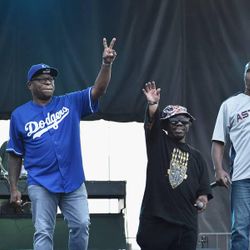
Before the release of the album, Bushwick Bill had lost an eye in a shooting incident with his girlfriend, and the cover featured Willie D. The fires were fanned in 1991 with the release of the group's second proper LP, We Can't Be Stopped. The Geto Boys' association with controversy was far from over, though rap groups were a hot topic for moral-minded politicians during the early '90s, and several leaders used the Geto Boys as an example to decry the state of modern music. By late 1990, Rubin had found another distributor, Giant Records, and the album was released - as The Geto Boys - that same year. He was ready to release it on his Def American label in 1990 when distributor Geffen balked at "Mind of a Lunatic," a track that described necrophilia with a murder victim. and the Jukebox quit, forcing Smith to add a dwarf-dancer-turned-rapper named Bushwick Bill (born Richard Shaw, Jamaica) and two Rap-A-Lot solo acts: Ackshen (aka Scarface born Brad Jordan, Houston) and Willie 'D' Dennis (born Houston).Īfter the Geto Boys' Grip It! On That Other Level caught the ear of hip-hop impresario Rick Rubin (LL Cool J, Beastie Boys), Rubin remixed and re-recorded tracks from the album. Formed as the Ghetto Boys in Houston by rap entrepreneur James "Lil' J" Smith (and signed to his Rap-A-Lot label), the group originally consisted of Prince Johnny C., the Slim Jukebox, and DJ Ready Red. When the Geto Boys came together in 1986, though, it was with a completely different lineup. After releasing solo albums during the mid-'90s, the Geto Boys reunited in 1996 for their most praised album yet, The Resurrection.

Their follow-up, We Can't Be Stopped, eventually hit platinum, though the trio of Scarface, Willie D., and Bushwick Bill began to fracture by 1993.

The controversy, which occurred two years earlier than similar censorship incidents involving Ice-T and 2 Live Crew, gave the Geto Boys a large amount of publicity. Blocked from distributing their 1990 major-label debut by Geffen - who insisted that a track dealing with necrophilia as well as murder was a step too far - the group was saved by producer Rick Rubin, who arranged another distributor for the album, released on his own Def American label. Though the controversial subject matter of gangsta rap wasn't much of a barrier to popular success during the '90s, the Geto Boys' recordings proved almost too extreme for widespread exposure.


 0 kommentar(er)
0 kommentar(er)
